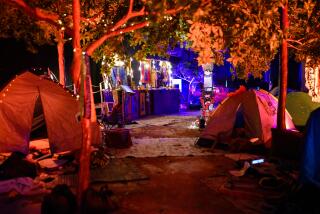Suicide Bombers Kill 14 at Moscow Concert
- Share via
Moscow — Two female suicide bombers presumed to be Chechen terrorists blew themselves up near the entrance to an open-air rock concert here Saturday, killing at least 14 others, Russian authorities said.
The blasts, which injured at least 51, came about 15 minutes apart, with the second explosion causing most of the deaths. Some of the seriously wounded were evacuated by helicopter from the suburban airfield concert site.
Most of the audience of about 40,000 was unaware of the attacks, and to avoid panic, authorities made no immediate announcement of what happened. The daylong concert continued in a festive atmosphere on the first hot day of summer, as many youths sunbathed and others danced.
The reaction of those told of the bombings indicated that the attack may increase Russians’ support for Moscow’s campaign against separatist guerrillas in Chechnya, a republic in the southern Caucasus.
“I think Russia’s policies in Chechnya will become much tougher,” said Dilyara Suleymanova, 18, who was selling trinkets from a small stand at the edge of the crowd. “I don’t think they should be given independence. I think the authorities should crack down on them with more force, so the hotbeds of terrorist activities will be stamped out.”
After defeating Russian troops in a 1994-96 war, Chechens exercised self-rule. But Russian forces returned in 1999 and have fought the guerrillas ever since. Violence continued in the republic Saturday, with two policemen reported killed when a mine blasted their vehicle in Grozny, the capital.
Russian media also reported Saturday that a journalist working for Agence France-Presse had been abducted in Ingushetia, a Russian republic adjacent to Chechnya. Ali Astamirov, 34, a Chechen who had worked for the news agency for a year, was taken from his companions at gunpoint by masked men Friday night and driven away toward Chechnya, Russian news agencies reported.
The Moscow concert bombings come at a politically sensitive time, as Russian President Vladimir V. Putin pushes forward a plan to transfer more authority in Chechnya to local pro-Moscow figures. As part of that process, a Chechen presidential election has been set for Oct. 5, and control over security operations in the war-torn territory will be shifted from the Russian army and the federal security service to national and local police Sept. 1.
Russian parliamentary elections are scheduled for December, and Putin is expected to run for reelection in March. Putin’s tough stance on Chechnya helped propel him into the presidency three years ago, and he has tried hard to portray his policies as successful.
The first bomber Saturday saw that police were using metal detectors to check people entering the concert site at Tushino airfield on Moscow’s outskirts and decided to set off her device near the ticket office, the Russian news agency Interfax reported. The bomb failed to work properly, and only part of it exploded, killing the assailant and two bystanders, it said. A passport was found that identified her as a resident of Chechnya born in 1983, it said.
The second attacker set off her bomb at a market next to the concert site about 15 minutes later, and it exploded with full force. Authorities said the bombs had the power of more than a pound of TNT and were packed with metal pellets, screws and pieces of wire.
“They realized they would not be able to get past the police checkpoint, so they detonated their explosive devices before getting onto Tushino airfield,” Interior Minister Boris Gryzlov told reporters at the scene. “If they had managed to get onto the airfield, the consequences would have been much, much graver.”
Saturday’s incident was the fifth in a string of major suicide bombings, mostly in or near Chechnya, that have killed about 190 people since late December.
Those bombings followed a mass hostage-taking at a Moscow theater in October in which 129 captives died, nearly all from a sleeping gas that Russian forces pumped into the building before they stormed it. All of the 41 hostage-takers -- including Chechen women carrying explosives -- were also killed, authorities said. Many of them were executed at point-blank range while unconscious from the gas, according to Russian media.
“Over the 10 years of dirty and gory war, a tremendous amount of hatred and anger has built up in many Chechens,” said Nikolai Petrov, an analyst at the Moscow Carnegie Center.
“Driven by the desire to take revenge, these people stop at nothing, and can easily be convinced -- or are already ready -- to sacrifice their own lives,” he said. “These people do not even think that they are fighting for Chechnya’s freedom. They just go out and kill because they need to take revenge. There are many people like this in Chechnya, which means that terrorist acts like this will continue.”
At Saturday’s concert, Yevgeny Petrovich, 23, said he and a friend were in the entrance line around 3 p.m. when they heard “a loud pop.”
“We joked about it: ‘It must be another bombing,’ ” he said. But despite noticing a helicopter, they enjoyed the concert and were unaware of what had happened until told by reporters three hours later.
“Most likely no one knows about it. If they had told the people about it, there would have been a great panic here,” said Vladimir Sivtsov, 20, Petrovich’s friend.
“It was better not to announce it on the loudspeakers,” Petrovich said. “The people are here to party. Let them have fun. They announced on the loudspeakers that the concert wouldn’t go as late as planned, but they didn’t say why.”
The concert, featuring prominent Russian rock bands such as Time Machine and the King and the Jester, ended about half an hour before its scheduled 10 p.m. close. Many in the crowd left before then, encouraged to do so by an announcement that some of the headlining acts would probably not appear.
While the concert was underway, Sergei Galanin, leader of one of the bands that performed, Serga, told state-run Channel One television that word of the deaths had “a very grim impact on the musicians” but that “none has refused to play.”
Petrovich, the concertgoer, said he thinks the attack will have “no consequences” in Chechnya because the Kremlin wants to play down the conflict there before the elections. “But Moscow police will treat people from the Caucasus more severely, with the roundups they conduct whenever things like this happen,” he said.
The Interior Ministry later announced what sounded like just such a crackdown. “Police patrols will be reinforced to the maximum in places of mass gatherings, hospitals, theaters, trading complexes and market places,” Itar-Tass news agency reported. Checks of suspicious vehicles and their drivers will be stepped up and security tightened at railway stations and airports, it said.
While Petrovich said he is “absolutely against” granting Chechnya independence, he said his main concern wasn’t politics.
“The most important thing is we have to make sure authorities don’t put a ban on big concerts and parties like this,” he said. “It’s the ordinary people who would suffer. It wouldn’t change anything for the Chechens. They can put a bomb somewhere else.”
Alexei V. Kuznetsov of The Times’ Moscow Bureau contributed to this report.
More to Read
Sign up for Essential California
The most important California stories and recommendations in your inbox every morning.
You may occasionally receive promotional content from the Los Angeles Times.













